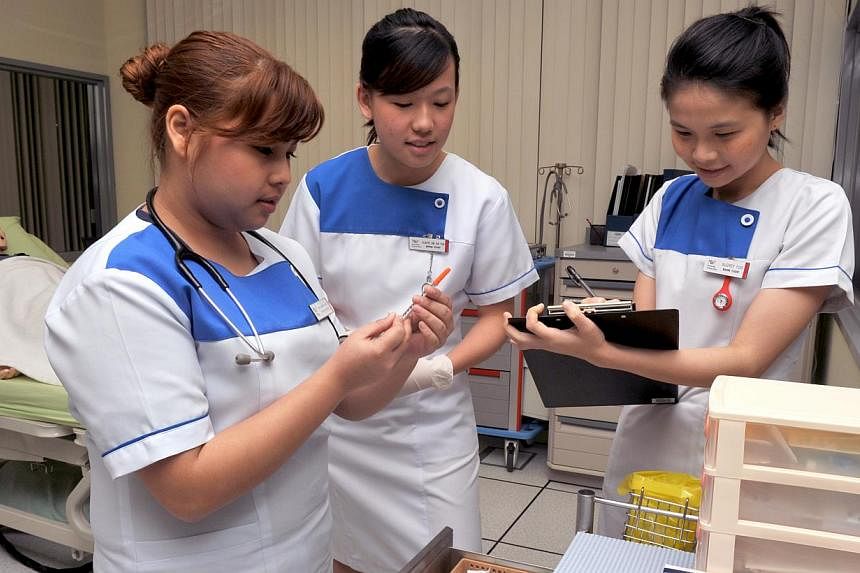The Applied Study in Polytechnics and ITE Review (Aspire) committee, tasked with enhancing the education and job prospects for students from the Institute of Technical Education (ITE) and polytechnics, released its report on Monday.
The committee, led by Senior Minister of State for Education Indranee Rajah, made 10 recommendations which fall under three broad themes:
- Better choices: Helping students make better education and career choices;
- Deeper skills: Helping polytechnic and ITE students grow the skills they need;
- More pathways: Building more paths that will allow polytechnic and ITE graduates to progress in their careers.
Here are six things to note from the report:
1. Better career guidance for students
Students in secondary schools, junior colleges, polytechnics and ITE will soon have trained education and career guidance officers who can offer them advice.
A pilot will be launched in 2015, involving about 40 to 50 secondary schools and junior colleges. There will be one trained officer for every few secondary schools and junior college/centralised institute. There will be three to five such officers in each polytechnic and ITE college.
The polytechnics and ITE will develop a new education and career guidance programme covering areas such as personal management and career exploration.
To train career guidance officers and those interested in this field, Republic Polytechnic will offer a new specialist diploma in career counselling in October 2014.
A one-stop portal will also be set up for students and working adults to make transiting to the workforce more seamless.
2. Work and study at the same time
From 2016, a place-and-train programme will introduced for those who have completed basic studies at the ITE and polytechnics.
The programme - modelled after the Swiss and German apprenticeship schemes -will allow them to work and further their qualifications at the same time. They will be employed by companies and paid monthly salaries. They will undergo structured on-the-job training in the workplace, which will be complemented with classes at the ITE and polytechnics.
Trainees who were from the ITE can work towards higher-level trade certificates and diplomas, while those from the polytechnics can aim for advanced and specialist diplomas.
The scheme can be organised differently, depending on the industry or type of job. An ITE trainee, for example, can work three days a week and study for a diploma two days a week or he can alternate between three months of work and three months of study.
For a start, ITE will offer their graduates place-and-train diploma programmes in emergency medical technology (or para-medicine), marine and offshore engineering, hotel and restaurant management, pastry and bakery, and environmental engineering.
The polytechnics will do so for courses including specialist or advanced diploma programmes in aerospace, biologics, marine and offshore engineering, built environment, info-communications technology, and logistics.
3. More Higher Nitec places at ITE, more structured internships
The Education Ministry will increase the number of Higher Nitec places for ITE students. From 2015, there will be 100 more such places, primarily in engineering and info-communication courses. Currently, about one in three Nitec students progress to Higher Nitec. The Education Ministry hopes to push the figure up to one in two.
Internships for polyetchnic and ITE students will also be more structured, such as having clearer learning goals and better-designed internship curriculum.
For a start, the polytechnics and ITE will enhance internships in the built environment sector, marine and offshore engineering, and early childhood education within the next three years. The duration of internships may also be lengthened to make the experience more meaningful for students.
4. More subsidies for post-diploma courses
More support will be given to polytechnic graduates taking up their first post-diploma courses.
Subsidies will be increased to 90 per cent of course fees - from the current 85 per cent - for those taking up their first post-diploma certificate in selected courses, two or more years after completion of the programme.
The polytechnics will also offer an additional full-time option for some of the post-diploma courses so that they can be completed within a shorter time.
5. Closer link between school training and NS
National servicemen could be posted to vocations in national service (NS) that suit the courses they took in the polytechnics or ITE, so that they will stay in touch with all that they learnt during the two years away from school.
National servicemen could also obtain industry-recognised accreditation for relevant skills honed during NS so that they will be better placed to join the industry they had trained for.
6. National training scheme for poly and ITE graduates
A national training scheme which focuses on industry-specific skills will help those who have completed basic studies at the ITE and polytechnics deepen their knowledge and progress in their careers.
Under the scheme, frameworks will be drawn to specify the industry-relevant skills required for workers to advance, and can be used to establish benchmarks for hiring and promoting workers.

